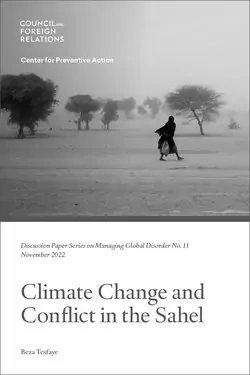
Climate Change and Conflict in the Sahel

The African countries of the Sahel stand to be among the most affected by climate change. To help mitigate its effects, Beza Tesfaye argues that the United States should partner with civil society groups and expand climate adaptation and financing efforts.
- Report
The link between climate change and conflict is increasingly at the forefront of security and development discussions. One place of greatest concern is the Sahel, a region defined by challenging environmental conditions. The Sahel, which means “border” in Arabic, is a geographic region in Africa separating the Sahara Desert in the north from the tropics to the south. The six francophone countries of the western Sahel—Burkina Faso, Chad, Mali, Mauritania, Niger, and Senegal—are collectively home to more than one hundred million people.
Since the 2000s, the Sahel has been a prime focus of counterterrorism and stabilization efforts by the United States and Europe. Yet, despite multiple military interventions and billions of dollars in security assistance, violent conflicts involving jihadi insurgencies and intercommunal violence have steadily increased over the past decade, claiming tens of thousands of lives, displacing more than 2.5 million people within the region, and placing many more in need of humanitarian assistance. As instability grows and begins to spill over to coastal West African countries, policymakers in the United States and Europe are now looking to understand the structural and local drivers of conflict and fragility, including environmental factors.
More on:
Climate change predictions indicate that increasing temperatures and more frequent weather extremes will continue to hit the Sahel region harder than other parts of the world. Populations that inhabit the region have, in the past, adapted in various ways to environmental hardships, but the confluence of evolving economic, political, and social factors, coupled with the momentum of environmental shifts, presents new risks.
Overreliance on climate-sensitive, agriculture-based livelihoods is a risk factor in the Sahel. Overuse of water and land reduces resource availability over time; as agricultural production falters due to climate variability, food prices increase as food security declines. This phenomenon raises the risk of collective violence. These challenges could lead to heightened levels of deprivation and insecurity; the ability of Sahelian countries to manage these risks will depend on local, national, regional, and international responses.
Conflict in the Sahel is primarily rooted in political and governance-related weaknesses. Likewise, effective governance can mitigate and prevent climate-related conflict.
A proper recognition of the role that governance and policy play in shaping peace and security is crucial for framing climate security challenges in the Sahel, where institutional weaknesses are as formidable as environmental hardships. Climate change can also act to multiply threats of grave concern to the United States and the West. In the Sahel, those threats include the spread of violent extremism, growing demand for international aid, and the proliferation of weak, authoritarian governance. The United States would be well served to implement policies that try to tackle these issues through international cooperation and promote a more resilient and stable Sahel.
This is the eleventh Discussion Paper in the Managing Global Disorder series, which explores how to promote a stable and mutually beneficial relationship among the major powers that can in turn provide the essential foundation for greater cooperation on pressing global and regional challenges.
More on:
This Discussion Paper was made possible by a grant from the Carnegie Corporation of New York. The statements made and views expressed are solely the responsibility of the author.
Professors: To request an exam copy, contact [email protected]. Please include your university and course name.
 Online Store
Online Store